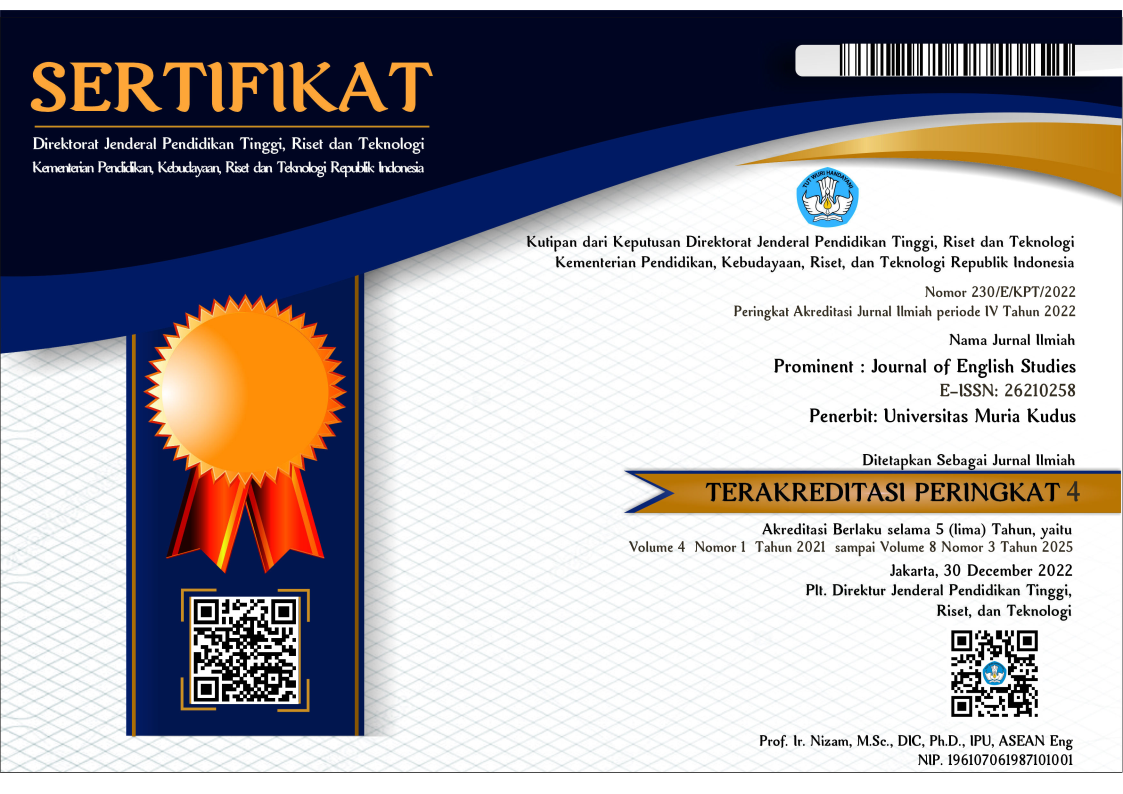Unveiling Feminist Themes: Simone de Beauvoir’s Influence on The Book Little Women
Abstract
Keywords
Full Text:
PDFReferences
Alcott, L. M. (1868). Little Women. Roberts Brothers.
Bach, T. (2023). The Importance of Realism about Gender Kinds: Lessons from Beauvoir. Analyse & Kritik, 45(2), 269–295. https://doi.org/10.1515/auk-2023-2011
Bennett, A., & Royle, N. (2016). An Introduction to Literature, Criticism and Theory (5th ed.). Routledge.
Berk, K. (2022). Why Beauvoir Is Not A Subjectivist about Meaning in Life. Journal of Philosophy of Life, 12(1), 39–54. https://www.philosophyoflife.org/jpl202203.pdf
Creswell, J.W. (2013). Qualitative Inquiry and Research Design: Choosing Among Five Approaches (3rd ed.). Sage Publications.
de Beauvoir, S. (2011). The Second Sex. Vintage Books.
Ekasanti, N. R., & Hernawati, M. (2019). Representation of Gender Stereotyping in Louisa May Alcott’s Little Women: Endorsement of Traditional Gender Roles. Lexicon, 6(2), 111–118. https://doi.org/10.22146/lexicon.v6i2.54682
Garcia, M. (2023). Thinking with Simone de Beauvoir Today. Analyse & Kritik, 45(2), 195–214. https://doi.org/10.1515/auk-2023-2018
Lestari, N. A., Aggraeni, D., & Bowo, T. A. (2023). An Analysis of Existential Feminism on Bombshell (2019) Movie. Jurnal CULTURE (Culture, Language, and Literature Review), 10(2), 69–76. https://doi.org/10.53873/culture.v10i2.541
Ni’mah, A. I. F., & Karima, F. H. (2022). Women’s Emancipation in Movie: A Feminism Analysis in Birds of Prey by Cathy Yan. Proceeding of English Teaching, Literature and Linguistics (ETERNAL) Conference, Universitas PGRI Semarang.
https://conference.upgris.ac.id/index.php/etll/article/view/2803
Rahma, R. K., Balqis, K. A., Wahyuni, S. I., Nasution, C. A., Hasibuan, D. M., & Purwarno, P. (2025). Liberal Feminism in Nancy Springer’s Movie Script Enola Holmes. Prominent: Journal of English Studies, 8(1), 1–16. https://doi.org/10.24176/pro.v8i1.13194
Rosemary, L., & Arianto, T. (2023). Woman Resistance toward Domestic Roles in “Little Women” Novel by Louisa May Alcott: Feminist Approach. Humanitatis : Journal of Language and Literature, 10(1), 77–92. https://doi.org/10.30812/humanitatis.v10i1.2221
Wilany, E. (2017). Feminism Analysis in the Novel Woman at Point Zero. Anglo-Saxon: Jurnal Ilmiah Program Studi Pendidikan Bahasa Inggris, 8(1), 1–10. https://doi.org/10.33373/anglo.v8i1.990
DOI: https://doi.org/10.24176/pro.v8i2.14873
Refbacks
- There are currently no refbacks.

This work is licensed under a Creative Commons Attribution-ShareAlike 4.0 International License.
Prominent Journal of English Studies is licensed under a Creative Commons Attribution-ShareAlike 4.0 International License.
Dedicated to:

in Collaboration with APSPBI:





